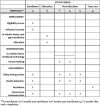ProjectDRIVE: study protocol for a randomized controlled trial to improve driving practices of high-risk teen drivers with a traffic violation
- PMID: 38553746
- PMCID: PMC10979602
- DOI: 10.1186/s40621-024-00494-5
ProjectDRIVE: study protocol for a randomized controlled trial to improve driving practices of high-risk teen drivers with a traffic violation
Abstract
Background: Teen drivers with a traffic violation are at increased risk for crashes and crash-related injuries; however, most parent-focused interventions target teen drivers with supervised learner's permits. Very few interventions are implemented at the probationary driver's license stage or target high-risk teen drivers, such as those with traffic violations. This paper describes the protocol of ProjectDRIVE, A Randomized Controlled Trial to Improve Driving Practices of High-Risk Teen Drivers with a Traffic Violation, which targets improving parent-teen communication about safe driving practices to reduce unsafe driving behaviors and traffic violation recidivism of teen drivers cited for traffic violation.
Methods: Teen drivers (ages 16 or 17) cited for a moving violation and the parent/legal guardian most involved with the teen's driving are recruited from juvenile traffic courts following their required court hearing. After completing informed consent/assent, enrolled dyads are randomized into one of three groups using stratified block randomization: control, device feedback only, or device feedback plus parent communication training. Participating dyads are followed for 6 months with 3 months of active intervention. Using in-vehicle device and smartphone application technology, the study provides real-time and cumulative driving feedback to intervention teens and collects continually recorded, objectively measured driving outcome data throughout the teen's study participation. Primary outcomes include rates of risky driving events and unsafe driving behaviors per 1000 miles driven. Secondary outcomes include traffic violation recidivism up to 12 months following study completion and frequency and quality of parent-teen communication about safe driving practices.
Discussion: Through partnership with the local juvenile traffic courts, this study integrates recruitment and randomization into existing court practices. Successfully completing this study will significantly impact juvenile traffic court's practices and policies by informing judges' decisions regarding the driving safety programs they refer to teens to prevent motor vehicle crashes and crash-related injuries and deaths. Trial registration The study was registered on ClinicalTrials.gov Registry (NCT04317664) on March 19, 2020, https://clinicaltrials.gov/study/NCT04317664 and updated on April 27, 2021. This protocol was developed per the SPIRIT (Standard Protocol Items: Recommendations for Interventional Trials) Checklist.
Keywords: Driving behaviors; In-vehicle feedback technology; Parent-teen communication; Teen drivers; Traffic violation.
© 2024. The Author(s).
Conflict of interest statement
The authors declare that they have no competing interests.
Figures
References
-
- Azūga. Azūga GPS Device. Azūga, Inc. https://azuga.com/technical-specs/. Accessed 24 May 2016.
-
- Bandura A. Social foundations of thought and action: a social cognitive theory. Englewood Cliffs: Prentice-Hall, Inc; 1986.
Associated data
Grants and funding
LinkOut - more resources
Full Text Sources
Medical
Miscellaneous




